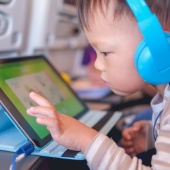What are the best ways of encouraging your baby’s speech development? We look at the stages they will reach and how you can help them from birth to two years old.
All babies are different and will develop at different rates. But here is what you might expect your baby to be able to say and do by certain key ages. Whatever their age, it helps to listen to what they’re ‘saying.’ Respond to them and reward their attempts to communicate (IHV, 2020).
If more than one language is spoken at home, our tips for raising a bilingual child may be useful.
From 0-6 months
At this stage, your baby might make burbling, cooing or babbling noises. They may also recognise your voice and show signs of enjoyment or make noises when you talk to them (Speech and Language UK, No date a).
They could (Speech and Language UK, No date a):
- Startle or jump at loud noises
- Turn towards a sound when they hear it
- Look at you when you talk to them
- Copy people smiling and laughing
- Make noises, such as squealing, to get your attention
- Have different cries for different needs, like hunger or tiredness
You can encourage these early attempts at communication. It will help your baby if you (IHV, 2020; NHS 2023):
- Look at them when you talk to them
- Tell them about what you’re doing as you do it
- Repeat the sounds they make back to them
- Sing to them, and speak in a sing song voice
If your baby doesn’t react to loud noises, look at your face when talking to them or smile back at someone smiling at them, they might be struggling to talk or understand words (Speech and Language UK, No date a).
In this case, talk to your GP or your health visitor. You could also look at the free information from Speech and Language UK.
Tiny Happy People has articles about your child’s development and milestones.
From 6-12 months
By the time they’re one year old, most babies will be able to listen carefully and may recognise familiar words like ‘ball.’ They may even start saying everyday words like ‘Mama’ or ‘Dada.’ They will also (Speech and Language UK, No date b):
- Enjoy action songs and rhymes
- Look at people who are speaking or if their name is called
- Start babbling, eg saying ‘na na’
- Start understanding simple short words like ‘bye bye’, especially when accompanied by an action
- Get your attention by making noises
- Point at you or turn to look where you’re pointing
- Enjoy playing games like ‘Peek a boo’
- Babble back to you in ‘conversations’
You can encourage their speech by (IHV, 2020; NHS, 2023):
- Reading together and talking about what you can see.
- Telling them the names of everyday objects for them to copy
- Playing games where they learn about taking turns, like ‘Peek a boo’
- Limiting using dummies to bedtime, and trying to stop using them completely by 12 months old
If you notice any of the following, you could speak to your GP, health visitor or their childcare provider (Speech and Language UK, No date b).
- By 9 months old, they don’t respond to noises
- By 12 months, they don’t point to things that interest them
- Your baby doesn’t try to get your attention through eye contact, facial expressions or reaching for you
You could also look at the free information from Speech and Language UK.
Tiny Happy People has articles about your child’s development and milestones.
From 12-18 months
By this age your baby will understand quite a few more words than they can say. They will know the names of everyday objects like clothes or parts of the body. You can also expect them to understand simple questions like ‘Where’s teddy?’ They will also: (Speech and Language UK, No date c)
- Say up to 20 words (like daddy or cup) although these might not be very clear
- Babble while playing as if they are saying little sentences
- Enjoy music and singing
- Copy what you do, like waving goodbye
- Enjoy pretend play with their toys
- Use actions or words to get your attention
- Enjoy looking at picture books with you
You can encourage them by (IHV, 2020; NHS, 2023):
- Saying the word properly if they get it wrong
- Giving them choices to build their vocabulary, like ‘Do you want an apple or a banana?’
- Providing opportunities for them to ask what they want
- Helping their listening skills with toys and books that make a noise
- Singing nursery rhymes with actions, which helps them remember the words
Your baby might need some extra help if: (Speech and Language UK, No date c)
- By 12-15 months they’re not babbling
- They haven’t said their first word by 18 months
- By 18 months, they don’t appear to understand what you’re saying to them
All children are different but if you notice any of these things, you could talk to your GP, health visitor or childcare provider. Free information from Speech and Language UK is available. Tiny Happy People has articles about your child’s development and milestones.
From 18-24 months
By this age your toddler might be able to play more independently on their own. They will understand at least 200 words, although they will be able to say about 50 (these might not be very clear). They will also be able to (Speech and Language UK, No date d):
- Put simple sentences together with 2-3 words
- Understand basic actions like ‘Kiss dolly’
- Ask questions like ‘What’s that?’
- Concentrate on simple picture stories
- Frequently copy sounds and words
- Understand short questions and instructions like ‘Stick out your tongue’
- Make the sounds of known animals, like ‘moo’
- Use a more limited number of sounds in their words than adults
- May get frustrated if you can’t understand them
You can encourage them by (NHS, 2023):
- Using repetition to help them learn words
- Keeping instructions short and simple
- Asking where things are, such as parts of the body
- Limiting daily screen time, or talking with them about what you’re watching
All children develop differently, but if your child is not saying 25 recognisable words or able to follow simple instructions by this age, it is worth talking to your health visitor or GP, or your child’s healthcare provider (Speech and Language UK, No date d). Also look at the helpful resources on Speech and Language UK.
Further information
Our NCT infant feeding line offers practical and emotional support with feeding your baby and general enquiries for parents, members and volunteers: 0300 330 0700.
We also offer NCT New Baby courses which are a great way for new parents to feel more confident.
Make friends with other parents-to-be and new parents in your local area and see what NCT activities are happening nearby.
IHV (2020) IHV Parent tips: Supporting your child’s speech language and communication development. https://ihv.org.uk/for-health-visitors/resources-for-members/resource/i… [27 Aug 24]
NHS (2023) Help your baby learn to talk. https://www.nhs.uk/conditions/baby/babys-development/play-and-learning/… [27 Aug 24]
Speech and Language UK (No date a) Ages and stages: 0-6 months. https://www.speechandlanguage.org.uk/help-for-families/ages-and-stages/0-6 months [27 Aug 24]
Speech and Language UK (No date b) Ages and stages: 6-12 months. https://speechandlanguage.org.uk/help-for-families/ages-and-stages/6-12… [27 Aug 24]
Speech and Language UK (No date c) Ages and stages: 12-18 months. https://speechandlanguage.org.uk/help-for-families/ages-and-stages/12-1… [27 Aug 24]
Speech and Language UK (No date d) Ages and stages: 18-24 months. https://speechandlanguage.org.uk/help-for-families/ages-and-stages/18-2… [27 Aug 24]







